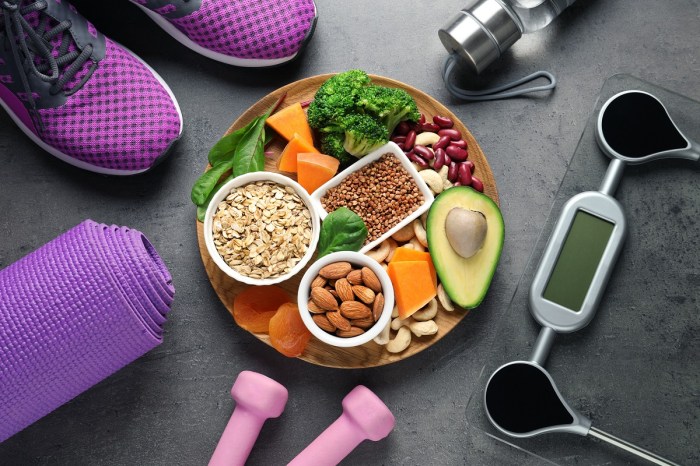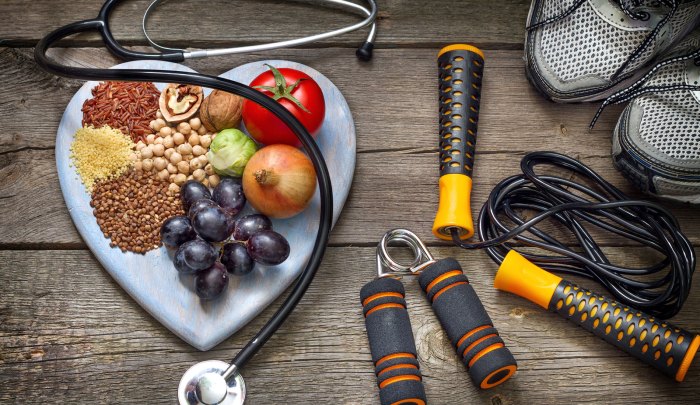Sports nutrition is the key to unlocking peak athletic performance, fueling your body with the right nutrients to excel in your sport. From macro to micronutrients, hydration, and supplements, every aspect plays a crucial role in your success. Get ready to dive into the world of sports nutrition and take your performance to the next level!
Overview of Sports Nutrition

Sports nutrition is a crucial aspect of an athlete’s training regimen, as it focuses on providing the body with the right nutrients to optimize performance, enhance recovery, and support overall health. Proper nutrition can make a significant difference in an athlete’s ability to train effectively, compete at a high level, and maintain peak fitness levels.
Key Components of a Sports Nutrition Diet
- Carbohydrates: Essential for providing energy during exercise and replenishing glycogen stores.
- Proteins: Necessary for muscle repair and growth, as well as supporting immune function.
- Fats: Important for hormone production, energy storage, and overall health.
- Vitamins and Minerals: Play a vital role in various bodily functions, such as metabolism and immune support.
Impact of Proper Nutrition on Athlete’s Health and Fitness Levels
Proper nutrition can have a profound impact on an athlete’s overall health and fitness levels. By fueling the body with the right nutrients, athletes can improve their performance, enhance their recovery, and reduce the risk of injuries and illnesses. Additionally, a well-balanced diet can help athletes maintain optimal body composition, improve endurance, and support long-term athletic success.
Macronutrients for Athletes
Carbohydrates play a crucial role in providing energy for sports performance. They are the body’s main source of fuel during high-intensity exercise and help replenish glycogen stores in muscles, which are essential for endurance and strength activities.
Protein is essential for muscle repair and growth in athletes. It helps repair damaged muscle tissues after intense workouts and supports the growth of new muscle fibers. Adequate protein intake is crucial for athletes to recover quickly and build lean muscle mass.
Fats contribute to long-term energy storage and hormone regulation in athletes. They provide a concentrated source of energy, especially during low to moderate-intensity exercise. Fats also play a key role in the production of hormones that are essential for muscle building and overall performance.
Micronutrients and Hydration
Proper nutrition for athletes goes beyond just macronutrients. Micronutrients and hydration play a crucial role in maintaining optimal performance and overall health.
Essential Micronutrients
- Vitamin D: Essential for bone health, muscle function, and immune system support.
- Iron: Important for oxygen transport in the blood, crucial for endurance athletes.
- Zinc: Supports immune function and helps with muscle repair and recovery.
Significance of Hydration
Hydration is key for athletes to regulate body temperature, maintain blood volume, and transport nutrients throughout the body. Dehydration can lead to decreased performance and even serious health issues.
Key Vitamins and Minerals for Athletes
| Vitamin | Function |
|---|---|
| Vitamin C | Supports immune function and helps with tissue repair. |
| Calcium | Important for bone health and muscle function. |
| Magnesium | Helps with energy production and muscle function. |
Pre-Workout and Post-Workout Nutrition: Sports Nutrition

Fueling your body properly before and after a workout is crucial for athletes to perform at their best and recover effectively.
Ideal Pre-Workout Meals or Snacks
Before a workout or competition, athletes should focus on consuming a balanced meal or snack that provides a mix of carbohydrates, protein, and healthy fats. This combination helps to fuel the body, optimize performance, and sustain energy levels throughout the activity.
- Examples of pre-workout meals/snacks:
- – Whole grain toast with almond butter and banana
- – Greek yogurt with berries and granola
- – Turkey and avocado wrap
Importance of Post-Workout Nutrition
After a workout, the body needs nutrients to repair muscles, replenish glycogen stores, and rehydrate. Proper post-workout nutrition plays a key role in recovery and helps athletes bounce back faster for their next training session.
- Key components of post-workout nutrition:
- – Protein for muscle repair and growth
- – Carbohydrates to replenish glycogen stores
- – Hydration to replace fluids lost through sweat
Timing of Nutrient Intake, Sports nutrition
The timing of nutrient intake around workouts is crucial for optimal results. Consuming a balanced meal or snack 1-2 hours before exercise provides the necessary energy, while refueling within 30 minutes to an hour after a workout helps kickstart the recovery process and maximize muscle repair.
Supplements in Sports Nutrition
When it comes to sports nutrition, supplements play a significant role in helping athletes achieve their performance goals. These supplements are designed to provide essential nutrients that may be lacking in the diet or to enhance athletic performance in various ways.
Common Supplements Used by Athletes
- Protein Powder: Helps in muscle repair and growth.
- Creatine: Improves strength and power output.
- BCAAs (Branched-Chain Amino Acids): Aid in muscle recovery.
- Omega-3 Fatty Acids: Reduce inflammation and support heart health.
Importance of Caution and Regulation
It’s crucial for athletes to exercise caution when using supplements, as not all products are safe or effective. The FDA does not regulate supplements as strictly as pharmaceuticals, so it’s important to research and choose reputable brands.
Scientifically Backed Supplements for Sports Performance
- Caffeine: Improves endurance and focus.
- Beta-Alanine: Enhances muscle endurance.
- Vitamin D: Supports bone health and immune function.